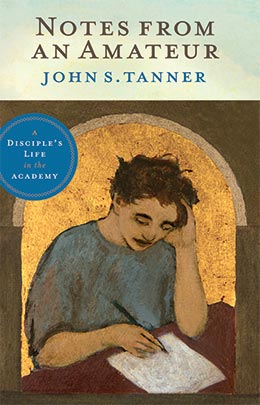The Holy and the Jolly
John S. Tanner, Notes from an Ameteur: A Disciple’s Life in the Academy (Provo, UT: Religious Studies Center; Salt Lake City: Deseret Book, 2011), 129–31.
My parents divided Christmas Eve between what Mom called a “holy” and a “jolly” time. During the holy time, we read from the Gospel of Luke, put on a family Christmas pageant, and sang religious carols. During the jolly time that followed, we sang Santa Claus songs, ate treats, laughed, played games, and generally made merry. Then Dad would invariably say that he thought that he heard sleigh bells outside and hurry us off to bed.
More than perhaps any other religious holiday, Christmas has a decidedly double rhythm of holy and jolly. It is Santa and Savior. It is holiday and holy day. It is commercial frenzy and Christian festival. We worry, rightly, that the former has come to overshadow the latter. At the same time, it would be wrong to exorcise the jolly from the holy at Christmas altogether, in an act of Puritanical rigor. Of all religious holidays, Christmas serves to remind us that merriment, laughter, song, and good cheer belong within the precincts of heaven.
Long ago, the angel sounded the season’s properly festive chord. Then and now, Christmas is a time for gladness and joy—a merry time. The scriptures that speak of Jesus’ birth are suffused with excitement and joy, even “exceeding great joy” (Matthew 2:10). It is thus fitting that we greet one another at this season with “Merry Christmas.” The salutation suits both the holy and the jolly dimensions of the holiday.
So much art depicts Christ as a man of sorrows. He is portrayed in suffering, solemn, or serious mien. But surely Jesus smiled as well, and even laughed. His teachings are replete with references to feasts and reveling; his parables are populated with partygoers. And he himself is portrayed as a frequent guest at feasts. Indeed, he performed his first miracle at a wedding party, where he turned water to wine. And he was censured by the Pharisees for failing to fast and for eating and drinking with sinners. Is it incompatible with his character as Savior to imagine Jesus as jolly? If “jolly” conjures only Santa in the modern mind, how about a “merry” or “mirthful” Messiah?
To be sure, some forms of merriment deserve censure and should be eschewed. Some revelry resembles the drunken Bacchanalia of many New Year’s Eve parties rather than a merry, Dickensian Christmas party. Some partying indulges in the sort of “loud laughter” that is inimical to the Spirit (see D&C 88:69, 121) and in “riotous living” of the sort that the prodigal son regrets (Luke 15:13)—but not all. Remember, the same parable that condemns a son’s “riotous living” depicts a father celebrating the returning prodigal by throwing a great party. The father kills the fatted calf and invites the whole household to “make merry” in a celebration that seems to prefigure the joy and merrymaking in heaven over the repentant sinner (see Luke 15:11–32).
“Merry” has positive connotations in scripture. The pioneers are told to praise the Lord with singing, music, and dancing when they feel merry (see D&C 136:28). James gives similar advice to the early Church (see James 5:13). And the Lamanite young women who gather in Shemlon to sing and dance and make merry are to be commended for indulging in wholesome pastimes (see Mosiah 20:1). Merriment is salutary. As Proverbs says, “A merry heart doeth good, like a medicine” (Proverbs 17:22).
When I think of a merry figure in literature, I think of Tom Bombadil in The Lord of the Rings. He is a sort of Santa figure who sings and laughs his way through life and out of every danger. He possesses a heart so deeply mirthful that no fear touches it and darkness is dispelled by it. He is the personification of good cheer and an image of its prophylactic power against the dark.
It is false wisdom to always be solemn. John Milton, the famous Puritan poet, countered the false piety of his overly rigorous fellow religionists for refusing to relax and, now and then, drench a day in mirth. He writes that it is not wise to load up our lives with “superfluous” burdens and refrain from rejoicing when “God sends a cheerful hour.”
Gratefully, God sends a cheerful day in which to be merry every year. Christmas reminds us that we embrace a gospel of good cheer. From the angels’ exultant chorus to the simple greeting “Merry Christmas” by a friend, Christmas conjoins the holy and the jolly. It reminds us that jollity, merriment, mirth, and cheer have an honored place in heaven and on earth.
So Merry Christmas!
